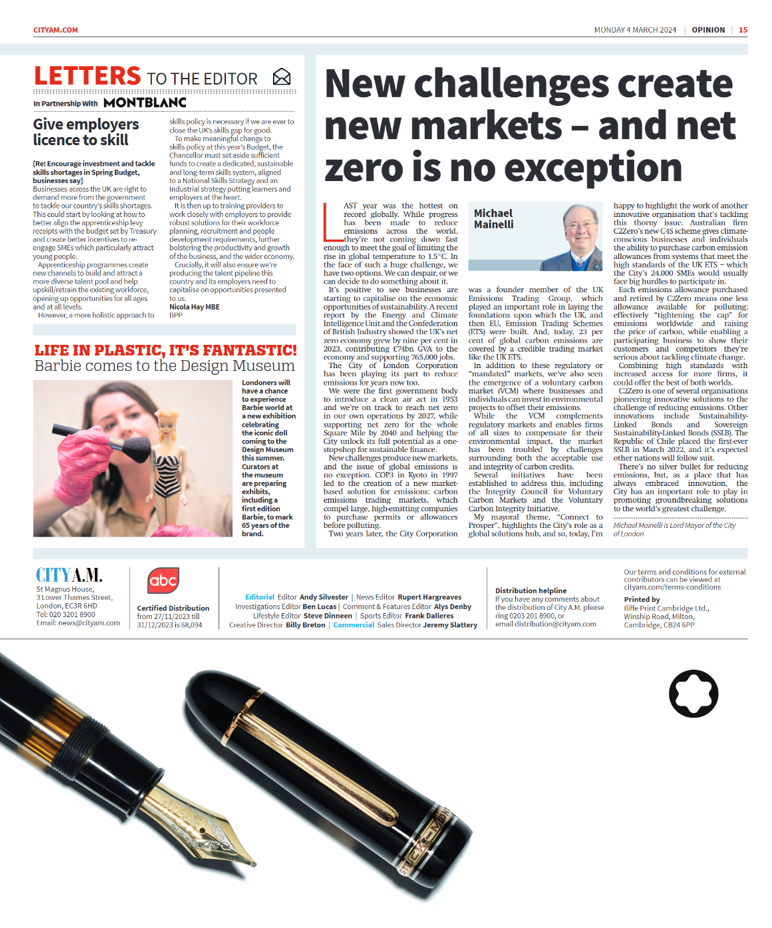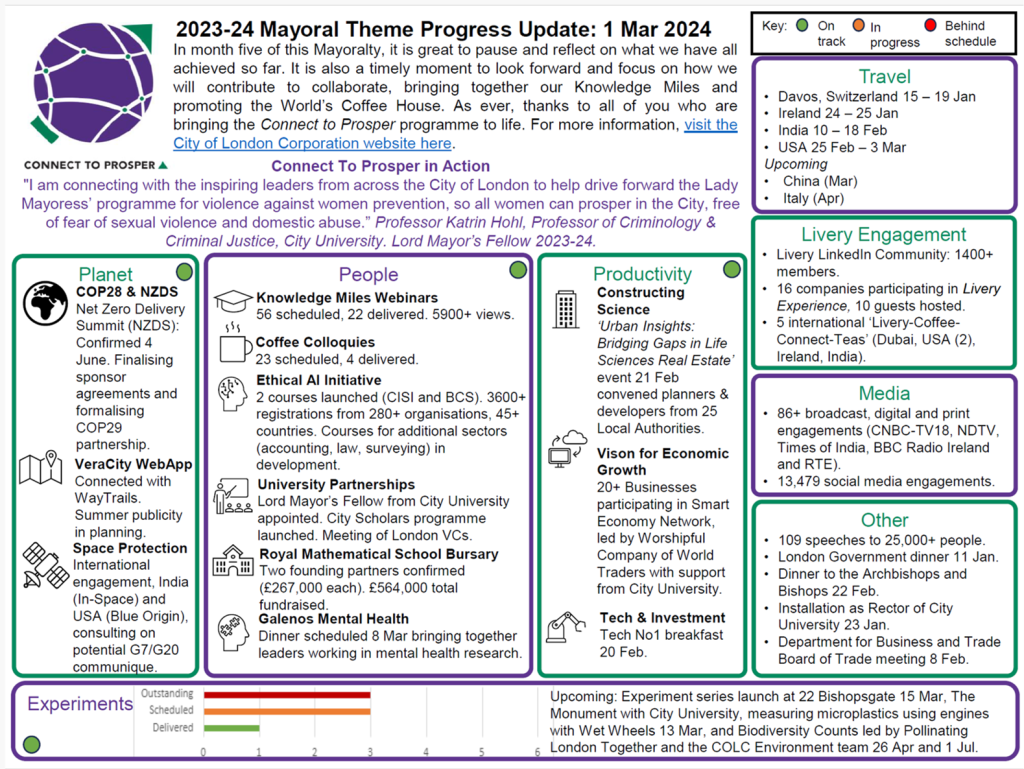“New challenges create new markets – and net zero is no exception” – City AM


Very kind piece by Jane Playdon, George Littlejohn, and the entire team at CISI – “Connecting The Dots“.
Remarks to: Dinner to Archbishops and Bishops, Egyptian Hall, Mansion House, Thursday, 22 February 2024, by the Rt Hon The Lord Mayor of London, Alderman Professor Michael Mainelli
“Your Graces, Archbishop, My Lords, Bishops, Fellow Aldermen, Mr Dean, Sheriffs, Chief Commoner, Ladies and Gentlemen. Good evening and a very warm welcome to Mansion House for this dinner to the Archbishops and Bishops.
Each of tonight’s three speakers will speak on the theme of “disagreeing agreeably” – to be able to express opposing views and beliefs to each other, with civility and respect. To be able to share ideas and this planet with others, recognising that we are not always in agreement, but also recognising our common humanity.
We are honoured to be joined tonight by a real expert in disagreeing agreeably and in helping others to do so: Rebecca Clark, Chair of the Civil Mediation Council. We very much look forward to hearing your insights. I look forward to hearing from the Archbishop of Canterbury, and appreciated your words of support at the Lord Mayor’s Banquet.
Just three months ago, you said: “If we rediscover some of that original coffee house culture and have conversations that build community, common understanding, curiosity and civility, we might rise to this new era and its challenges together.”
Before I go further, I wish all the Church of England Bishops here a very successful Synod in the coming days – I am sure at the Synod you always practise the art of disagreeing agreeably.
On that topic … A Catholic priest and an Anglican vicar were sitting in a train compartment together. They had a long and pleasant discussion, and both remarked how well they were getting on with each other. The priest said, “We have so much in common, after all. You worship God in your way, and I worship God in His way.”
I would like to share a few of my own thoughts on “disagreeing agreeably”. In the first week of my mayoralty in November, we convened a multi-faith event at St Ethelburga’s Centre for Reconciliation and Peace. Senior Rabbi Joseph Dweck, Chief Imām Dr Sayed Razawi and Revd Dr Alan McCormack led us in an exploration of themes of heritage, culture, and integration – at a time when reconciliation is sorely needed.
And this month, I welcomed 18 leaders of different faiths to Mansion House for a private dinner and asked them to share their thoughts on the one factor that was essential in order to have peace. We had a huge range of responses:
The one factor … was – harmony, divinity, restraint. … reconciliation, remorse, humour … empathy, entrusting, justice, ambition … love, faith, friendship, and we leant a hyphen to a few folk: inner-peace and constructive-ambiguity, and – interestingly – conflict and doubt.
Personally, my wife beat me to my chosen word, Tolerance.
In his 1910 “Man in the Arena” speech, Theodore Roosevelt said that, “to be successful we must learn to combine intensity of conviction with a broad tolerance of difference of conviction.” In other words, great minds become greater by meeting minds different to their own – great minds don’t all think alike.
French Enlightenment thinker Voltaire popularised the famous phrase, “I do not agree with what you say, but I will defend to the death your right to say it”.
The City of London is the world’s oldest democratic workers’ and residents’ cooperative, nearly 14 centuries of commerce, community, and charity.
From its earliest beginnings, the Square Mile has welcomed new people…myself included. The City of London has its challenges – that goes without saying – but I also consider it to be one of the most tolerant places on the planet… And I think that can be traced back, in part, to the emergence of a new arena for public discourse in the seventeenth century: The Coffee House.
Early coffee houses were places of temperance and also of tolerance. Caffeine, a stimulant, lubricated conversation in a way alcohol, a depressant, never could. Coffee houses allowed Londoners of diverse backgrounds share to share their ideas and beliefs and refine the art of disagreeing agreeably.
As one historian wrote, “whether a man was dressed in a ragged coat and found himself seated between a belted earl and a gaitered bishop it made no difference…he was able to engage them in conversation and know that he would be answered civilly”.
Today, people often aren’t so much talking to each other, as over each other. Quarrelling rather than arguing. Just as in the seventeenth-century coffee house, our modern-day City is a place where all comers, speaking some 300 languages, are welcome, new ideas are embraced, and people disagree agreeably.
That difference of perspectives enriches the City in so many ways. Sir Malcolm Rifkind tells a story about Margaret Thatcher, that she was once asked, “Mrs Thatcher, do you believe in consensus?” She replied: “Yes, I do believe in consensus; there should be a consensus behind my convictions.”
Or to quote Charles de Gaulle: “I have heard your points of view. They do not match mine. The decision is therefore unanimous.”
My mayoral theme, “Connect To Prosper”, celebrates the Knowledge Miles of our Square Mile, and seeks to revive our coffee house tradition, stimulating conversation between different groups, encouraging ideas and, ultimately, ensuring that London can fulfil its potential as a global solutions hub that addresses the big issues of the day.
Hand in hand with tolerance, though, I believe another essential ingredient for disagreeing agreeably is doubt. The Danish philosopher Soren Kierkegaard wrote that to have faith, one must also have doubt.
To have tolerance of other ideas and viewpoints, one must also have doubt – to accept the possibility that you are wrong, and the other person is right.
Doubt is also essential for scientific progress: it opens the mind to new theories, new discoveries and new solutions. The spirit of “I am not too sure, but I’m listening” runs through all our Connect To Prosper initiatives… By embracing tolerance and doubt, we progress through disagreeing agreeably.
You know that London was founded as a Roman city and that there is a Roman amphitheatre under what is now Guildhall. Once, at the Colosseum in ancient Rome, a Christian was thrown into the ring to be devoured by a lion.
He tried to run away but quickly realised the lion would soon catch him. Clutching at straws, the Christian turned to face the beast. As it reared up to strike him, the Christian cried out,
“Oh God, I beseech you, turn this lion into a Christian!” Instantly, the lion fell to its knees. The Christian also fell to his knees, crying: “Thank you, oh God, for this miracle!”
But then he noticed that the lion was muttering a quiet prayer: “Oh Lord, for what I am about to receive…”
Agreeing agreeably
I know that all of you can help all of us in our great city, to restore the art of disagreeing agreeably, and if there are subjects where we can agree agreeably, that will also be a bonus.
Thank you.”
Landed in Delhi and learning lots…
Continue readingRemarks to: Rotary International Presidential Peace Conference, at the International Maritime Organisation, Saturday, 10 February 2024, by the Rt Hon the Lord Mayor of London, Alderman Professor Michael Mainelli.
Continue readingDelighted to have been able to speak at length with and get this back – “London Calling“!
Continue readingAs the third Irish Lord Mayor in a row, and the third Irish Lord Mayor with a strong Trinity connection – studied Mathematics, Engineering & Computer Science for a year there in the early 1980s – it was a delight to host the alumni at Mansion House for a wonderful discussion with Provost Linda Doyle, chaired by the first Irish Lord Mayor, Vincent Keaveny.